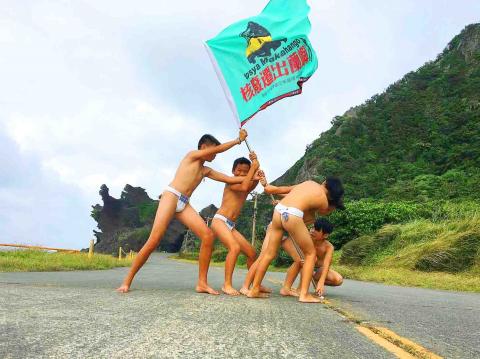Young Aborigines on Orchid Island (Lanyu, 蘭嶼) yesterday protested for a clear deadline for the removal of nuclear waste from the island.
Raising flags on the island, the campaigners said they would not accept an apology from the government and would not accept further delays for removal of the waste material.
The Orchid Island Youth Movement Alliance, which organized the protest, said that since President Tsai Ing-wen’s (蔡英文) apology last year to Aborigines for historical injustices, no action has yet been taken on the issue of nuclear waste on Orchid Island — where more than 90 percent of residents are Tao.

Photo courtesy of Yen Tzu-yu
The Lanyu nuclear waste storage facility was built in 1982 and stopped processing nuclear waste in 1996.
In February, the government reiterated its promise to relocate waste on the island and panned several potential sites including uninhabited islands near Keelung, as well as Kinmen, Penghu and Matsu counties.
Chanting slogans outside the waste facility, campaigners demanded that the government take concrete action and clarify a timetable for when waste relocation would be completed.
“We are not interested in empty promises or in talking things over,” one campaigner said.
Another said they are concerned that the issue is being overlooked by society and that they hoped to draw people’s attention to the issue.
“We demand that the government deal with this issue immediately,” they said.
The alliance said the storage of the waste on the island constitutes an illegal act by Taiwan Power Co.
The company had leased the space for waste storage, but that lease expired in 2014, the alliance said, adding that the township would not continue the lease.
Many of the island’s residents participated in yesterday’s protest, with others hanging banners on their doors in support.

Chinese spouse and influencer Guan Guan’s (關關) residency permit has been revoked for repeatedly posting pro-China videos that threaten national security, the National Immigration Agency confirmed today. Guan Guan has said many controversial statements in her videos posted to Douyin (抖音), including “the red flag will soon be painted all over Taiwan” and “Taiwan is an inseparable part of China,” and expressing hope for expedited reunification. The agency last year received multiple reports alleging that Guan Guan had advocated for armed reunification. After verifying the reports, the agency last month issued a notice requiring her to appear and explain her actions. Guan

GIVE AND TAKE: Blood demand continues to rise each year, while fewer young donors are available due to the nation’s falling birthrate, a doctor said Blood donors can redeem points earned from donations to obtain limited edition Formosan black bear travel mugs, the Kaohsiung Blood Center said yesterday, as it announced a goal of stocking 20,000 units of blood prior to the Lunar New Year. The last month of the lunar year is National Blood Donation Month, when local centers seek to stockpile blood for use during the Lunar New Year holiday. The blood demand in southern Taiwan — including Tainan and Kaohsiung, as well as Chiayi, Pingtung, Penghu and Taitung counties — is about 2,000 units per day, the center said. The donation campaign aims to boost

The Kaohsiung Tourism Bureau audited six hotels in an effort to prevent price gouging ahead of Korean band BTS’ concert tour in the city scheduled for Nov. 19, 21 and 22 this year. The bureau on Friday said that the audits — conducted in response to allegations of unfair pricing posted on social media — found no wrongdoing. These establishments included the local branches of Chateau de Chine, Hotel Nikko, My Humble House, and Grand Hai Lai, it said, adding that the Consumer Protection Commission would have penalized price gougers had the accusations been substantiated. The bureau said the Tourism Development Act

The Central Weather Administration (CWA) said a magnitude 4.9 earthquake that struck off the coast of eastern Taiwan yesterday was an independent event and part of a stress-adjustment process. The earthquake occurred at 4:47pm, with its epicenter at sea about 45.4km south of Yilan County Hall at a depth of 5.9km, the CWA said. The quake's intensity, which gauges the actual effects of a temblor, was highest in several townships in Yilan and neighboring Hualien County, where it measured 4 on Taiwan's seven-tier intensity scale, the CWA said. Lin Po-yu (林柏佑), a division chief at the CWA's Seismological Center, told a news conference